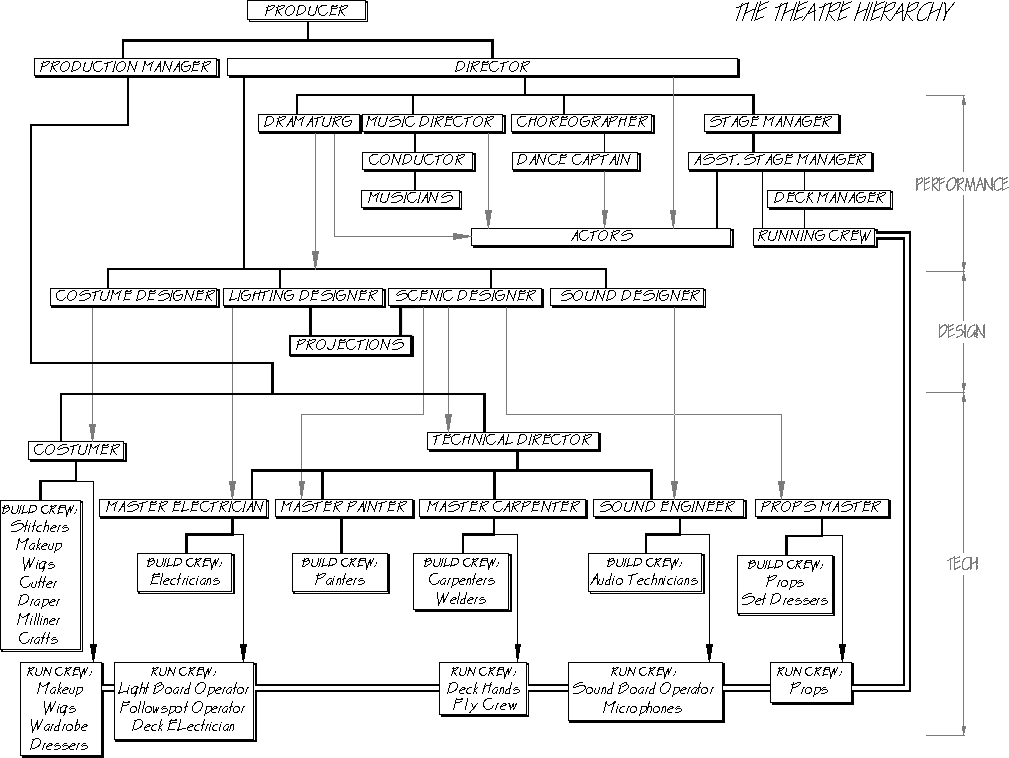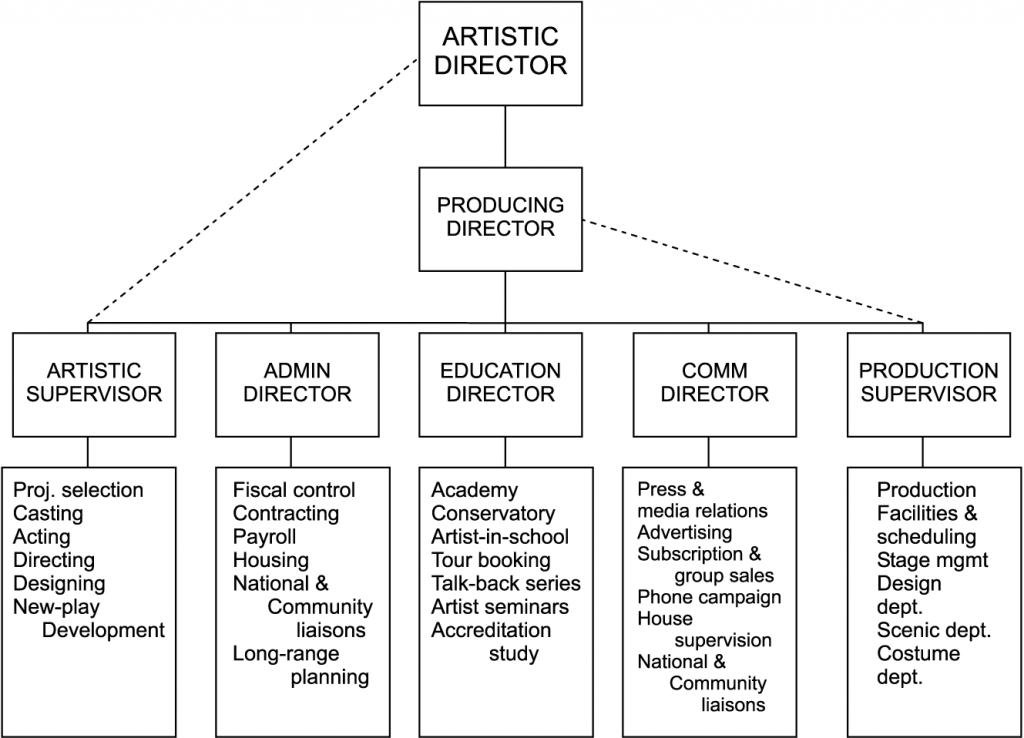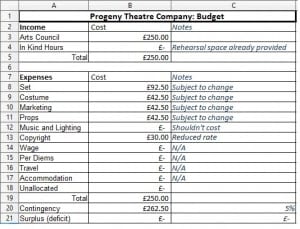The Producer: Analysis and Reflection

“The role of a theatre producer is to create or develop theatre projects. To create a project from the start, he/she has to be able to raise the money to employ all the people necessary to bring the project to fruition: a writer (if it is a new play), a director, a design team, actors, stage management, technicians, publicists, marketing personnel ((http://www.stagework.org.uk)).”
“I’d like to think that if a producer has done their job well, their involvement will go unnoticed! By that I mean that the show is good, sells well and runs smoothly. I have been credited as the producer on shows where my role has been almost exclusively administrative – i.e. looking after the money side of things and generally making sure that the practical aspects of a show tick along as they should. But I much prefer those shows where I have had a stake – or even been the lead player – in the creative process ((http://www.britishtheatreguide.info/articles/070903.htm)). “
I recently read an article by Lyn Gardner ((http://www.guardian.co.uk/stage/theatreblog/2008/apr/04/whatstheproducersrole)) that outlined an experiment the Old Vic done in which actors, directors and producers each attempted to outline what it is that the role of producer entailed. Each answer varied greatly and I think that really highlights the ambiguity of the producer role: most people are unclear and this extends at times as far as the producer. Having a vastly different range of producers whether line producers, creative producers and executive producers does not help in this ascertaining. Usually the producer is the first person that is found for a project so in some ways they’re able to define their role individually. In ascertaining the importance of the producer, their role and ascertaining where he would come in the hierarchy of theatre companies, I attempted to find examples of hierarchies to ascertain where he is placed. After investigation, I found that there is much ambiguity as to where the Producer is placed within theatrical infrastructures. As such, I will explore models in an attempt to gauge not only where the Producer is often placed but also to justify the role I took within the process of creating A Gothic Tale.
This hierarchy ((http://www.emeraldinsight.com/content_images/fig/1190150202001.png)) places the producer underneath the artistic director. The Artistic Director is at times a producer or director; this is made exemplified by Jason Alexander of Reprise Theatre Company and Gregory Doran of the Royal Shakespeare Company. In placing a producer or director as Artistic Director, a certain consistency and overriding vision is projected on the show. While this may initially sound negative, it is at the same time positive. A vision set by an Artistic Director must be adhered to by a director and producer and this allows for a certain unity. It is also useful as a way to prevent disputes within the company should they arise in relation to the artistic vision. This is a role however that is especially effective in certain circumstances. In the event that a Theatre Company does not use the same directors and producers for a performance, the artistic director is able to ensure that they are producing a performance that the theatre company believes matches their aims and manifestos.
The role of artistic director was not used in our process, much to my discontent, because at times there were disputes over what direction to take the show or script in. Within a working environment, this would likely not be the case. However, in a student lead production, it is almost impossible to create a hierarchy that works as fluidly as a work environment. This is likely because of the level of involvement within the performance but also the lack of hierarchy already within place: having been comrades for our entire time together here, there was a sense of equality rather than one of hierarchy and at times this was problematic. I cannot help but feel that an artistic director would have been able to resolve many of the difficulties within the process. That being said, with no way of enforcing those wishes on a group, it once again falls down to a battle of wills in an attempt to win. However, with an artistic director in place, it would be a very different group dynamic. The director at times almost became the artistic director but only fell short because her wishes were often questioned. While it is debatable whether this is right or wrong, it is certain that this made the process much more laborious and arduous. It is something that would not have happened in a work environment because of the different levels of adherence to hierarchies.
The role of Artistic Director closely resembles the filmic model of Producer or Executive Producer. The filmic industry exemplifies the success that this role can create: while the director largely has creative control, in the event that a producer (or in this instance artistic director or executive producer) believe that the marketability has been compromised or the viability of the film to make a profit, they step in and insist it is changed. The Director, in most cases, is powerless against this. It is essential to note though that the producer rarely involves him or herself and only does so in extreme circumstances. The producer of a film, not dissimilar to the procedure within theatre, is the first person taken on board and they will then find somebody that is able to create the best results. As such, disputes are rare. That being said, there are exceptions to this role and usually they revolve the high profile directors of Hollywood who are granted more artistic licence than most because of their reputation and standard. However, having this power potentially reduces the risk of creative disasters or risks to the selling of a product.
The second model ((http://www.plymouth.edu/department/mtd/files/2010/06/heirarchy.jpg)) that perhaps encompasses all of the roles we had within our production can be found below. This model places the producer at the top of a hierarchy with ultimate control of a production.  The production manager and director are then placed below. What is interesting about this structure is the placing of the director underneath the producer. I am inclined to disagree with this model in some ways because I feel that the director and producer should always be a team rather than individuals. While the production manager makes the technical wishes of the director come alive, the producer and director must unify their visions in order to produce a spectacular show. Petty squabbles between the director and the producer are often stereotyped and I can appreciate that it is often the case that the director wants excessive things to realise their creative vision whereas the producer has to balance the books. However, it is ineffective for these things to happen and it is my belief that a good pairing of producer and director reduces the risk of these confrontations. Within our process, the producer and director relationship was highly effective because we always knew what the other person was doing or needed to do in order to achieve results. Any potential issues were raised to the other well in advance and this enabled us to pre-empt problems that might arise. This model therefore does not represent the dynamic of Progeny Theatre Company. What is perhaps useful within this hierarchy though is the placing of almost all the other roles. The model itself is useful in demonstrating what I had imagined my job role to be within the company at the beginning of the process. I was not able to fully articulate the job role within the viva voce and so I hope that this clarifies more what I believed my job to entail. The reality of my role within the company though was not as it would ideally have been. The producer, as discussed in this post and in previous posts, is involved in the creation of a show mainly through administration and organisation. This much was certainly true for this process; with a team of individuals I compiled budgets, monitored finance and assisted with marketing. Creative decisions were certainly left to the director in most instances which was highly effective. However, one flaw in the process was the lack of ability to have the overriding say to the people who would usually be under the producer in a hierarchy. It was unclear from the beginning of the process exactly how much we were meant to emulate a working environment and my previous experience as a film producer in the other half of my degree meant that I had a different view of a producer. This was problematic at times because I was told that I should not be doing things, such as making changes to marketing, when it was my belief that I should. Either way, I wholly respect the boundaries of roles. Further clarification was at times needed so that problems were solvable because of differing views on things. My main duties within the show were as follows:
The production manager and director are then placed below. What is interesting about this structure is the placing of the director underneath the producer. I am inclined to disagree with this model in some ways because I feel that the director and producer should always be a team rather than individuals. While the production manager makes the technical wishes of the director come alive, the producer and director must unify their visions in order to produce a spectacular show. Petty squabbles between the director and the producer are often stereotyped and I can appreciate that it is often the case that the director wants excessive things to realise their creative vision whereas the producer has to balance the books. However, it is ineffective for these things to happen and it is my belief that a good pairing of producer and director reduces the risk of these confrontations. Within our process, the producer and director relationship was highly effective because we always knew what the other person was doing or needed to do in order to achieve results. Any potential issues were raised to the other well in advance and this enabled us to pre-empt problems that might arise. This model therefore does not represent the dynamic of Progeny Theatre Company. What is perhaps useful within this hierarchy though is the placing of almost all the other roles. The model itself is useful in demonstrating what I had imagined my job role to be within the company at the beginning of the process. I was not able to fully articulate the job role within the viva voce and so I hope that this clarifies more what I believed my job to entail. The reality of my role within the company though was not as it would ideally have been. The producer, as discussed in this post and in previous posts, is involved in the creation of a show mainly through administration and organisation. This much was certainly true for this process; with a team of individuals I compiled budgets, monitored finance and assisted with marketing. Creative decisions were certainly left to the director in most instances which was highly effective. However, one flaw in the process was the lack of ability to have the overriding say to the people who would usually be under the producer in a hierarchy. It was unclear from the beginning of the process exactly how much we were meant to emulate a working environment and my previous experience as a film producer in the other half of my degree meant that I had a different view of a producer. This was problematic at times because I was told that I should not be doing things, such as making changes to marketing, when it was my belief that I should. Either way, I wholly respect the boundaries of roles. Further clarification was at times needed so that problems were solvable because of differing views on things. My main duties within the show were as follows:
- Acting in minor roles in order to assist in the creation of an atmosphere.
- Marketing: Assisting in the marketing campaign but also aiding in the creation of the poster to ensure that it adhered to the creative vision of the show but also to ensure that quality was met. We decided to design the poster from within rather than have an external party and as such, I think we did a good job at creating a professional poster.
- Finance: Myself and Francesca compiled the budget that allowed for each department to know what their spending could go up to. I then had Francesca catalogue the expenditures as and when they were approved so that we could account for any spendings and ensure that it was all on appropriate items.
- Copyright: Bartered and gained the licence in order to be able to adapt Angela Carter’s The Bloody Chamber.
- Business Contacts: I was able to get our group discounted printing of marketing items such as posters in order to have high quality items. I was also able to get an interview on Siren FM.
- Profile of the show: I was interviewed on Siren FM in order to promote the show. As such, the show was then plugged repeatedly throughout the remaining time until the show and on their website in order to increase accessibility to ticket sales. I also aided in the social networking of the show in order to reach an online audience.
I realise that the producer is intended to be more assertive but at the same time, it was a condition impossible to emulate because certain conditions simply could not be met. That being said, I feel that I handled the role well and was able to assist the director in creating a show that was staged magnificently. In assisting marketing, finance and acquiring the copyright, I played an essential role in not only getting permission for the show to be created but also to help create a marketing campaign while liaising with the venue and staff members to ensure that problems were resolved as quickly as they could be making the process much easier.

